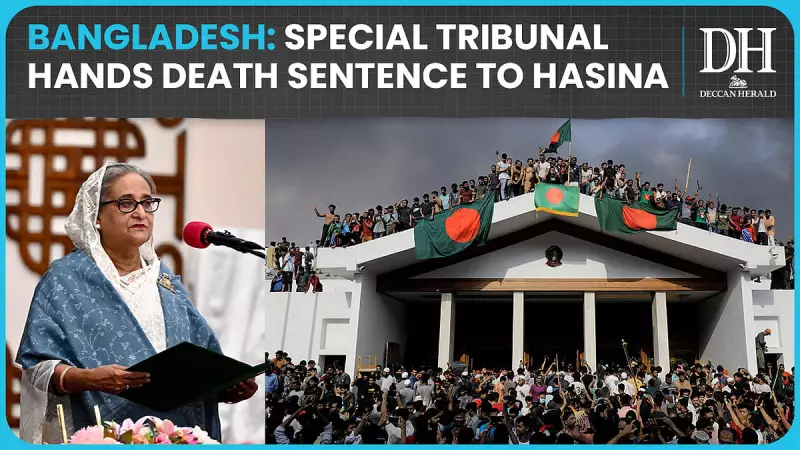
A Bangladesh court has delivered a landmark verdict, sentencing seven individuals to death for committing crimes against humanity during the country's 1971 liberation war. The judgment marks another significant step in the nation's ongoing reckoning with its violent past.
The Tribunal's Historic Verdict
The International Crimes Tribunal-1 of Bangladesh found all seven accused guilty of multiple charges related to crimes against humanity. The convicted individuals include Md Yusuf Ali, Md Abdul Gani Hawladar, Md Abdur Rauf, Md A K M Yunus Ali, Md Abdul Majid Howladar, Md Nazrul Islam, and Md Mujibur Rahman. These men faced trial for their alleged involvement in atrocities committed during Bangladesh's struggle for independence from Pakistan.
Justice Md Shahinur Islam, presiding over the three-member panel of judges, announced the verdict that has been decades in the making. The tribunal concluded that the evidence presented proved beyond reasonable doubt that all seven accused participated in and facilitated various crimes against humanity in their respective areas during the liberation war.
Details of the Charges and Evidence
The prosecution built a strong case demonstrating that the convicted men collaborated with the Pakistani army and engaged in systematic violence against the civilian population. The charges included murder, torture, rape, arson, and looting - all classified as crimes against humanity under international law.
According to court documents and witness testimonies, the accused were involved in establishing and operating peace committees that actively supported Pakistani military operations. These committees allegedly identified and targeted individuals who supported Bangladesh's independence movement, leading to their persecution and elimination.
The tribunal examined numerous witness accounts and documentary evidence that painted a grim picture of the accused's activities during the nine-month-long war. The evidence suggested they played active roles in the torture and killing of unarmed civilians, as well as the destruction of property belonging to independence supporters.
Legal Proceedings and Defense Arguments
The legal process saw extensive arguments from both prosecution and defense teams. Chief prosecutor Rezia Sultana Chaman led the case for the state, presenting compelling evidence gathered over years of investigation. The defense team, comprising lawyers Gazi M H M Tamim, S M Shamsul Alam, and Abdus Sattar Palwan, argued for their clients' acquittal, challenging the evidence and witness credibility.
Throughout the trial, the defense maintained that the accused were either falsely implicated or that the evidence against them was insufficient. They raised questions about the timing of the cases and the reliability of witness testimonies given the decades that had passed since the alleged events occurred.
However, the tribunal ultimately found the prosecution's evidence convincing enough to establish guilt beyond reasonable doubt. The judges noted the systematic nature of the crimes and the accused's active participation in the atrocities.
Broader Context and Political Implications
This verdict occurs within the larger framework of Bangladesh's ongoing efforts to address war crimes committed during its liberation struggle. The Sheikh Hasina-led government has made the prosecution of war crimes a central pillar of its political agenda, establishing the International Crimes Tribunal specifically for this purpose.
Since the tribunal's establishment, it has delivered several significant verdicts, including death sentences and life imprisonment for individuals convicted of similar crimes. These proceedings have been both praised and criticized, with supporters arguing they bring long-delayed justice, while critics question the fairness and timing of the trials.
The current verdict reinforces the government's commitment to pursuing accountability for wartime atrocities, even five decades after the events. It also sends a strong message about the state's determination to address historical injustices, regardless of how much time has passed.
International Reaction and Domestic Response
War crimes trials in Bangladesh have typically drawn mixed reactions from the international community. Human rights organizations and foreign governments have closely monitored the proceedings, with some expressing concerns about due process while others acknowledge the importance of addressing historical crimes.
Domestically, the verdict has been welcomed by many who see it as justice finally being served for victims and their families. However, it has also sparked debates about the political implications of such trials and their timing in Bangladesh's complex political landscape.
The verdict comes at a time when Bangladesh continues to grapple with the legacy of its violent birth as a nation, with the 1971 war remaining a deeply divisive and emotionally charged subject in the country's collective memory.
As the legal process moves forward, with possibilities for appeals and reviews, the case represents another chapter in Bangladesh's ongoing journey toward coming to terms with its difficult past while shaping its future as a nation committed to justice and accountability.





